How Much Does It Cost to Weld a Muffler in 2025?
Last Updated on

Welding is a process that can range from an easy skill level to an expert level undertaking. But welding a muffler isn’t something you have to do all the time, which explains why most people may not know the cost.
Looking up quotes online can prove challenging because there is scanty and varying information.
This article will cover everything you need to know about welding car mufflers, the cost to anticipate, and other related info. Keep reading to learn more!
Why Do You Need to Weld a Muffler?
The muffler is a crucial part of a car. It will reduce the engine’s noise and ensure that poisonous gasses are emitted safely.
A hole in the muffler could be dangerous to you and your passengers and can cause a high-pitched noise as you drive. Replacing the muffler will solve the problem, but welding it is more cost-effective.
Usually, mufflers are made of steel, a material that holds up under high exhaust pressures. It’s also flexible enough to absorb vibrations and reduce noise.
Being solid and durable, it can be challenging when you want to join two pieces of material together using an adhesive or by screwing them into place. Welding is the best method. It creates a permanent bond between the two pieces of metal that will withstand the same pressure as the rest of the muffler. When welding a muffler, little heat is needed.

How Much Does Professional Muffler Welding Cost?
A muffler is a crucial part of a car’s exhaust system. It has a series of valves and chambers that slow down the gasses, causing them to expand and cool slightly. This expansion also causes a pressure drop as the gas moves through the system. It makes it quieter.
The muffler is held to the exhaust pipe using clamps or welded on at the joints. Welding is a more reliable and permanent means of attaching these two systems than clamps.
Minor welding of mufflers costs range from $30 to $500. The cost depends on the labor rates in your locality and the degree of repair. The average cost of professional muffler welding is $280.
If you want to weld a new muffler, it may run you anywhere from $75 to $750. It depends on the make and model. That’s the amount you’ll pay a professional mechanic to weld a new muffler on your vehicle’s exhaust.
If other parts of the exhaust system are also faulty and need welding or repair, you’ll pay as much as $1,000 to $2,500. These parts include catalytic converters and exhaust pipes.
Here’s a breakdown of these muffler welding costs.
| Type of Weld | Cost |
| Minor muffler welding | $30 to $500 |
| Welding a new muffler | $75 to $750 |
| Welding a muffler and other exhaust system parts such as exhaust pipe and catalytic converter. | $1,000 to $2,500 |
Additional Costs to Expect
Labor
The labor cost depends on the muffler parts that need welding and how much time it takes for a welder to complete it. It ranges from $80 to $100.
New Muffler Cost
Your vehicle may need a new muffler welded depending on the damage to the previous muffler. The cost of buying a high-quality, performance muffler ranges from $75 to $300.

Factors Affecting the Cost of Welding a Muffler
1. Muffler Size
Your muffler will vary in size depending on the make and model of your vehicle. Mufflers for larger vehicles such as trucks are much larger than those used in smaller cars. Usually, the larger the muffler size, the more expensive it will be to weld.
2. A Welder’s Experience
An experienced welder charges more than a novice welder would. However, working with experience yields better results.
3. The Condition of the Muffler
If a muffler has major rust damage or holes in it, the welder will spend more time fixing it before welding it back together. Also, if the damage is significant enough, the entire muffler may need replacement instead of just welding. This means a significant rise in the overall cost.
4. Muffler Type
The type of muffler can make a notable difference in the price. Some mufflers have complex designs that may take more time to be welded. Welding will be more challenging and expensive if your muffler has a complex design.
5. The Location of the Muffler
The location of the muffler is a primary factor influencing the cost of welding. A muffler located on the rear bumper costs more to weld than one located under the vehicle. It takes time and effort to take the muffler out and then weld it back in place.

Does Car Insurance Cover the Cost to Weld a Muffler?
Car insurance does not cover welding a muffler since it is not considered a mechanical problem. But, if you have comprehensive coverage on your auto policy, you can get coverage for welding repairs under this policy.
Signs That Indicate Your Muffler Has Issues
You might not think about your muffler too often. That’s why many people don’t realize when there is a problem. Here are some signs that point to a faulty muffler.
1. It’s Louder Than Usual
Have you been hearing a louder than the ordinary sound from your car? If yes, get your muffler checked. While the noise can be due to several reasons, sometimes a simple exhaust leak causes the noise.
2. Reduced Fuel Efficiency
Another sign that your muffler is not working well is reduced fuel efficiency. If you notice that your gas mileage has decreased, it shows that something isn’t working well in the exhaust system.
An automotive technician should check the loud roaring sound coming from the back of your car when speeding up. There could be an issue with the muffler or the exhaust system!
3. Condensation in the Exhaust Pipes
If you have condensation dripping from the exhaust pipe, there is a good chance that your muffler is damaged. Condensation forms when moisture from the air meets with gasses inside the exhaust system.
The moisture from combustion and other processes gets trapped within the muffler, where it condenses and drips out of the tailpipe.
4. Bad Smell
A damaged muffler can cause an odor in the exhaust system. Usually, it’s because the exhaust fumes are filtered through the holes in the muffler before they are expelled from the tailpipe.
If these holes become clogged or blocked, it causes a build-up of exhaust fumes that escape through other parts of the vehicle, causing an unusual odor.

Different Types of Mufflers
A muffler is a sound suppression device. It reduces or changes the tone or sound intensity of an engine. It’s crucial because the exhaust system determines your car’s performance and fuel efficiency.
There are different types of mufflers available in the market today. Here are some of them:
1. Resonance Type Muffler
The resonance type muffler uses the tuned pipe concept to absorb, cancel, and redirect sound waves. The most common type of resonance muffler is the Helmholtz resonator.
It uses a tube plugged at one end and an air cavity at the other. Also, it’s effective at canceling low-pitch tones.
2. Absorber Type Muffler
The absorber-type muffler is the most popular type of exhaust system. It has two chambers and perforated tubes with fiberglass packing between them.
The exhaust gas enters one chamber, goes through perforated tubes, and gets absorbed by fiberglass packing. Then, it passes through to another chamber. The primary advantage of this muffler is that it reduces both high and low-frequency sounds.
3. Wave Cancellation Type Muffler
This muffler uses design elements that create counter waves in the exhaust to reduce or eliminate some frequencies. It results in an improved exhaust tone. These are commonly used in modified cars seeking more power and an enhanced sound profile.

4. Combined Resonance and Absorber Type Muffler
This muffler looks like a conventional straight-through muffler but has a resonator in the middle. It’s packed with sound-absorbing materials.
The exhaust gas flows through the center. The resonating chamber is connected to the outer shell of the muffler, which is also packed with sound-absorbing material.
5. Baffle Type Muffler
If you want a simple muffler with enough power to handle your car’s horsepower, the baffle-type muffler is the way to go. It’s the most basic design of all mufflers.
The device consists of many tubes with holes and chambers running through them. Your exhaust enters one end, passing through these tubes and chambers before exiting at the other end.
It creates resistance and turbulence. Also, it reduces your engine noise while still allowing adequate airflow.
You might also be interested in:
Final Thoughts
Welding a muffler can cost dozens or hundreds of dollars. Usually, it depends on what model you have, who does the work, and your location. It’s not an overwhelming amount of money, but it’s something to keep in mind ahead of time.
Hopefully, this article has been a helpful reference for anyone looking to get a quote on welding a muffler. With the information in this article, you can have a better idea of how much you should expect to pay for the job.
Featured Image Credit: alexeisido, Shutterstock
